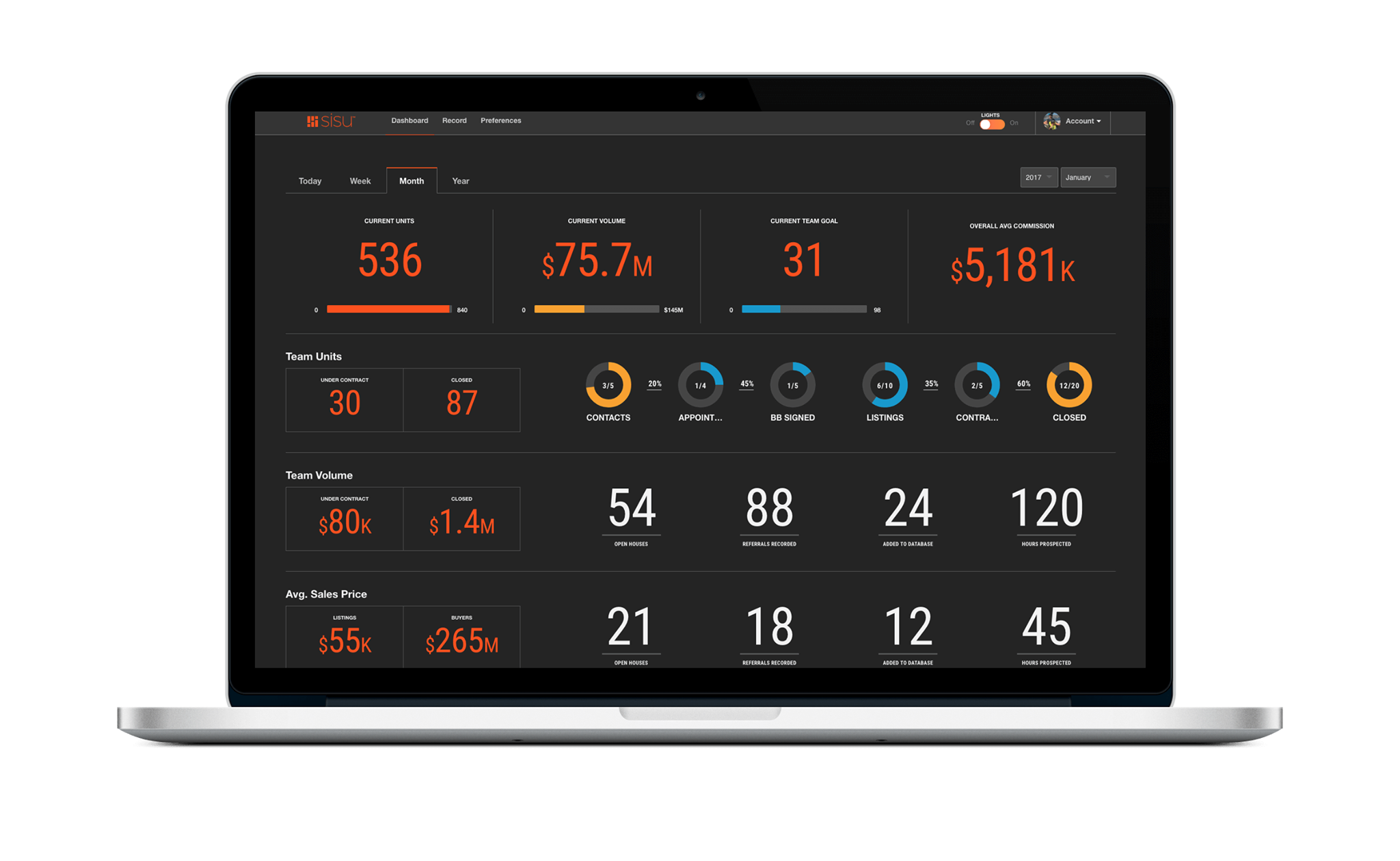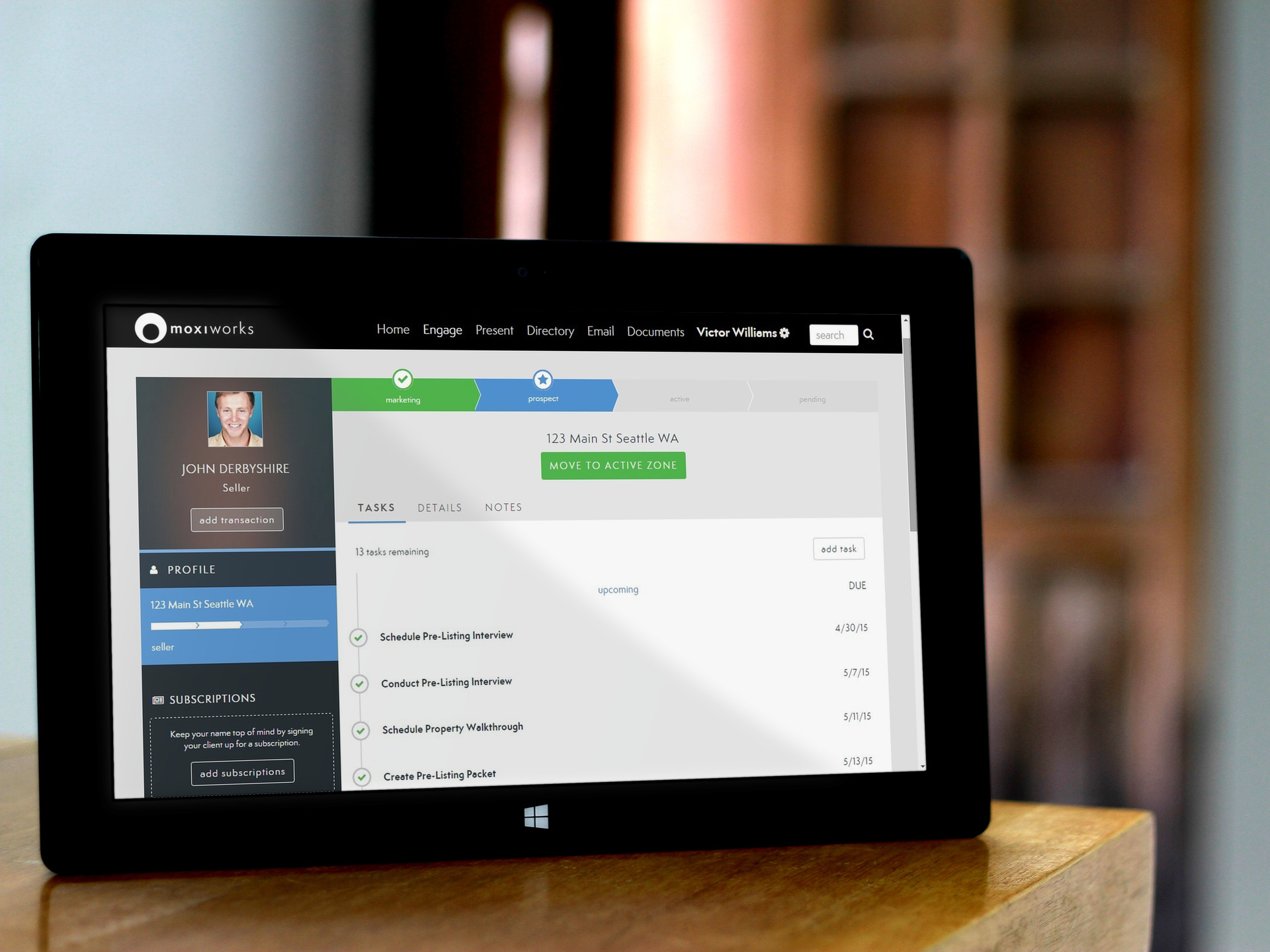Introducing: Sisu, Accountability Software for Real Estate Agents

 On the heels of our latest exciting announcement that MoxiWorks is powering LeadingRE’s new initiative, the LeadingRE Cloud, we’re now thrilled to welcome a new best-in-class tool the Moxi Cloud: Sisu – an accountability software solution for real estate agents.
On the heels of our latest exciting announcement that MoxiWorks is powering LeadingRE’s new initiative, the LeadingRE Cloud, we’re now thrilled to welcome a new best-in-class tool the Moxi Cloud: Sisu – an accountability software solution for real estate agents.
Like MoxiWorks, Sisu isn’t just another tech company, its real estate roots run deep. Sisu began a few years ago when a team of real estate agents in Salt Lake City leveraged a system of disciplined tracking and analysis of agent activities to more than double their sales numbers. Recognizing the power of the system they had created, Sisu Founder and CEO, Brian Charlesworth, developed the system of accountability into full-fledged software that gamifies and visualizes the data to increase the top line revenue of agents.
Sisu is built to track sales performance and coach agents to success through powerful data. This data needs to be connected to contacts within a CRM, so agents can use it to grow their relationships. Enter Moxi Engage. The partnership between Sisu and Moxi creates a single point of entry and collaboration between the services. This way the data will be more clean, accurate, and easy to maintain.
Here’s how it works:
Visualize what is achievable
Sisu’s accountability software solution “doubles production with intuitive performance tracking, monitoring, leaderboards, and dashboards, and eliminates duplicate entry with real-time, real estate CRM data sharing.” According to Sisu, real estate agents that consistently track and know their daily sales activities and KPI’s increase sales by at LEAST 100%. As we like to say, the numbers will set you free.
See more, sell more
Sisu also has a mobile app that provides a competitive edge with contact, and appointment tracking and viewing, conversion ratio calculation, pipeline overview, and real-time GCI reporting. This means agents are constantly in the know and reminded of there they stand the steps they need to take to increase their bottom line.
Accountability through visibility

With a simple to use interface, and robust and dynamic sales performance dashboards, Sisu enforces accountability, which we all know is a key aspect when it comes to adoption. It displays real-time scoreboards and leaderboards throughout your brokerage and on your real estate agent’s phones, accelerating competition, creating a fun sales environment, and producing outstanding results.
Motivate, play, win
Inspire increased levels of team performance with a seamlessly linked, online community of peers while empowering them to track, analyze, compare, and filter their leaderboards to measure results. Sisu makes selling competitive, visual, fun and more importantly, highly productive.
With the sales competition in place, agents will be motivated to go out and drive results. With the data stored in the Moxi Cloud and across other brokerage plug and play tools and services solutions, they’ll have all the data they need to be effective. They’ll be able to track down expired listings and previous clients, and the software will automagically log all of their efforts and update the scoreboard.
We’ve said over and over again how powerful data is to your brokerage and your agents. Data is now the most sought-after and powerful commodity in the world. If you’re not using your brokerage data to the fullest, you’re missing out on higher productivity and of course, more profit.
We’re ecstatic to add another like-minded partner to our Moxi Cloud open platform that knows the importance of data. If you’re interested in adding Sisu to your brokerage power strip of tools and services, please contact your dedicated Moxi Account Manager and they’ll get you set up. Want to meet the brains behind Sisu? You can set that up here.
Five Steps to Ultimate Success in 2018


By Tiana Baur
It’s the first quarter of 2018, which means it’s time to #GetShitDone (did you know that’s MoxiWorks’ company motto?!). Right here and now is the time to check off all the items that will soar you into your most successful and self-fulfilling year yet. And let’s face it, the one thing on everyone’s mind in Q1, is getting listings lined up to sell in Q2. Everyone is working as diligently and quickly as humanly possible but working hard and working smart can be two very different things. Because of that, we’ve put together a list of the five steps you need to take that will pay more dividends this year than anything else.
One: Do something that makes you feel good about yourself at least once a week
Maybe it’s standing in front of the mirror each morning and giving yourself a pep talk. Maybe it’s getting your nails done to look more polished in front of your clients. Maybe it’s taking language lessons to broaden your prospect scope. Little things can make a world of difference and it’s important you feel good about yourself, because you are your business. Mental health is incredibly important, don’t let yourself slip to the bottom of the priority list.
Two: Know who you are targeting with Moxi Insights
If you don’t know who you’re targeting, you’re basically taking shots in the dark. Wouldn’t it be amazing if there was some magic tool out there that could tell you who would be likely to list soon? Well, there is! If you haven’t heard, we have a new tool called Moxi Insights that is part of our Moxi Marketing suite. It aggregates public data for your entire sphere and auto-updates it for you too. There are even badges that identify those in your sphere that are likely to list and the reasons why they are likely to list.
Check it out – you won’t regret it.
Three: Prepare for those pesky taxes with QuickBooks
The worst part about tax season is being a 1099 independent contractor. It makes everything ten times more complicated. Finding all the receipts from the entire year and trying to ballpark your mileage is enough to drive someone mad. And even then, it’s easy to forget all the other stuff you can deduct, so by the end of it, after pure exhaustion and frustration, you throw your hands up and say, “whatever.” Well, it’s time to take the stress out of your taxes!!! QuickBooks Self-Employed was created just for independent contractors like real estate agents. It simplifies everything and does most of the heavy lifting, PLUS it saves people an average of $4,340 on their taxes. What’s not to love? More on QuickBooks Self-Employed and try it for cheap here.
Four: Try something new
Einstein’s definition of insanity is doing the same thing over and over and expecting different results. If you’re not happy with your current results and the shape your business is in, it’s time to try something new. It can be scary and nerve-racking to take the first step, you’ll hit roadblocks and some things will go smoothly while others won’t. Whether it’s as simple as trying a new marketing method or hosting your first party, it’ll be worth it!
Five: Get as many eyes on your listing as possible with Advertise Your Listing
It’s a digital age and if you’re not advertising on Facebook, are you really getting the most optimal reach for your listing? The answer is no. But I do realize not everyone is a Facebook pro and not everyone has the time to create and analyze their Facebook Ads, let alone have enough time to even eat lunch. That’s why we created Advertise Your Listing. It’s all the Facebook goods and glory you need to show your clients (including automagically sent client reports *cough cough*) that you’re a marketing genius and you deserve their repeat business. Also, it only takes you five minutes to set up, and we do all the heavy lifting.
Find out more about Advertise Your Listing here.
If you do these five steps, we promise you your success will be much greater than if you hadn’t. Whether you do these because your resolutions are calling your name or you’re always looking for ways to grow, these will make you more productive and increase your repeat and referral business. Regardless of the reason, it’s a #GetShitDone kind of attitude that lights the fire within and turns the mediocre into real estate legends. What are you doing today to help yourself tomorrow?
How to survive tax season as an independent contractor

 By Maddie Jostol
By Maddie Jostol
As an independent contractor, you’re running your own business – and you experience all of the perks and challenges that come with that. Tax season isn’t fun for anyone, but it’s particularly frustrating as a 1099 independent contractor.
We all experience the same thing year over year. Tax season arrives, and it’s all you can do to pull everything together to file, let alone do it in a way that will save you money. You work through the endless forms, attempting to find all of the information you need. You get to the part where you need to fill in your Schedule C deductions… and… nothing. Another year went by and you don’t have the necessary documentation to deduct most of your business expenses. “Oh well” you think to yourself, “it’s not worth the time anyway.”
Here’s the deal: real estate agents are losing serious cash by neglecting to take advantage of available deductions.
The truth is, it’s incredibly time consuming to track your expenses, mileage, and deductions all year-round. And guess what? It isn’t as difficult as it sounds if you start early in the year. Below are a few things you can do to help yourself survive tax season as an independent contractor.
1. Know what deductions you should be looking out for.
The first step is knowing what deductions are available to you – and there are more than you might think. Things like your home office or software subscriptions are deductible expenses that you shouldn’t let slip through the cracks. Know what you should be looking out for, so you can get a system in place to track them year-round.
For a comprehensive list of deductions and information about each, click here to download our Guide to Stress-Free Taxes for Agents.
2. Track your expenses as they happen.
Receipts are every independent contractor’s worst enemy. Paper or digital, they’re a pain to keep track of and they’re difficult to organize when it comes time to file those taxes.
Consider a simple personal accounting system like QuickBooks Self-Employed. This app lets you snap a pic of a receipt from directly within the app and it automatically categorizes and stores that receipt. It then matches the receipt with the expense when it comes through as a bank charge. When it comes time to file, all of those business expenses have been tracked, categorized for your Schedule C, and documented appropriately. You can officially say goodbye to that mismanaged shoebox of receipts.
Mileage tracking is one you definitely won’t want to miss. You’re always on the go. Some days it feels like you live in your car – you’re running errands before an open house, picking up signage, meeting with clients, and having coffee with prospective clients.
When you have the QuickBooks Self-Employed app, it tracks your mileage every time you get in your car (seriously!). You can then go into your app, view your recent trips, and swipe left or swipe right to designate those trips as business or personal. Yes, it can be that easy (we didn’t believe it until we tried it either). Easier than a dating app, even.
3. Don’t do it alone.
Get a reliable system in place. As much as we’d like to do it all ourselves, the reality is it takes time and energy that we’d rather put into closing sales. At the same time, there are thousands of dollars to be saved by efficiently managing your business finances. When you get technology on your side, it takes away the weight and frustration of accounting and tax filing.
The best part of this is that you don’t need a complex, expensive system, you just need one that is designed for 1099 independent contractors. That’s the key. Use an accounting system that fits your unique needs as a realtor and helps you run your business more smoothly.
Want to give QuickBooks Self-Employed a try? We’re offering 50% off your first 12 months (that makes it just $5/month!). Click here to try it out!
What to look for in a CRM

By Maddie Jostol
First of all… yes, you need a CRM. If you haven’t onboarded a standard agent CRM for your brokerage, then 2018 is the year to do so. A CRM (customer relationship management system) is where all of your agents keep and nurture their contacts, market to their sphere, manage their sales flow, track their goals, and much more. The CRM glues everything together.
What impact could a CRM have on your business? Here are a few quick facts:
- ” 74% of businesses using a CRM report improved customer relationships (Annuitas Group).
- ” Conversion rates can improve by 300% with a CRM in place (Cloudswave).
- ” Lead cost is reduced by 23% with a CRM in place (Cloudswave).
Vetting technologies can be challenging and complicated, especially a system as robust as a CRM. So, what should you be looking for in a CRM for your agents? Below are our recommendations for what you should consider when it comes to a CRM for your brokerage.
Your CRM should ‘understand’ the real estate business.
In general, CRMs should be intuitive. The system’s sales flow, prompts, and coaching should align with your business process. The home sales process is a unique one compared to other businesses. When considering an agent CRM, make sure the system makes sense for this sales process, taking into consideration sphere marketing, a long sales cycle, GCI goals, the transaction process, etc.
It must support your sphere-selling efforts.
The sphere-selling methodology is the way of the future. When agents strategically leverage their spheres of influence, their businesses grow in a sustainable way. In a competitive landscape, where all markets are thirsty for leads, an agent’s sphere is their power.
If you’ve invested in training and coaching to encourage your agents to leverage sphere-selling, they should be using a CRM that supports those efforts. What’s this look like? It means having your CRM integrated with your other contact databases, relevant segmentation options, and aggregated public data to keep up with the people in your sphere.
Integration will power your business.
Integration powers your business. In a sea of ad hoc tools, we’re all left attempting to remember passwords and experiencing tool fatigue. Select technology solutions for your brokerage that integrate with each other. This means that an agent can use all of their tools with a single sign-on and a cohesive flow.
Take lead generation, for example. When leads are generated – whether they’re from the agent’s website, or purchased from a lead provider, they should immediately appear in the agent’s CRM, and the agent should be prompted to follow up. This is bare minimum for a CRM. When it comes to sales enablement, guiding an agent through the necessary tasks from lead generation all the way through closing is key.
Integration goes far beyond lead generation. With Moxi Engage CRM, for example, an agents’ leads flow straight into their CRM, but they can also purchase client gifts, advertise on Facebook, execute print marketing campaigns, manage transactions, and much more, directly from their Engage account.
It must have live MLS data.
When it comes to a CRM in real estate, MLS integration is a must-have. When agents win listings, those listings automatically with their CRM, enabling them to truly manage the transaction from start to finish. It means agents never have to manually enter property data, saving time, and negating errors.
It should improve agent productivity.
When we talk about CRMs, we often talk about “tasks” and “actions” which, for some, can feel like the system is adding work. That’s just not true. The tasks that your CRM prompts should be actions that agents are already taking (and if they aren’t, then it’s even more reason to get a system in place). What the CRM does is streamline these tasks and remind the agent, so they don’t miss a beat.
Logging into your CRM and seeing everything you need to accomplish that day will change an agent’s workflow for the better. They always know what they need to do in order to reach their goals. They’ll be able to see who in their sphere they should reach out to, and be reminded to follow up with that one lead they talked to last week. They’ll be able to look back and see when they last spoke with so-and-so, and be reminded to send Mr. and Mrs. Smith a gift for their house-versary.
This increase in productivity all comes back to your business. Agents are not only able to accomplish more, closing more deals, but they also find better work/life balance, improving retention at your brokerage. Improved productivity adds up to revenue, having a nice effect on your business’ bottom line.
It’s a component of your open platform.
Your agent CRM is a (vital) piece of a larger puzzle. Your brokerage platform is the ecosystem where all of your technology tools and services live, integrate, and share data. Powering that is the CRM, hosting agent databases, consumer data, property data, and driving business results.
To learn more about the Moxi Engage CRM and the Moxi Cloud open platform, reach out to us to talk to a member of our team.
Leverage Content Marketing to Grow Your Business

 By Tiana Baur
By Tiana Baur
Time to take the “pitch” out of your marketing strategy. Content is the here and now, and the future of marketing as we know it. Growing your business is all about leads, and attracting said leads comes much easier when leveraging content marketing.
Chances are you’ve heard of content marketing, but maybe you aren’t exactly sure what it entails. According to the Content Marketing Institute, a resource for – you guessed it – all things content marketing, describes it like this:
“Content marketing is a strategic marketing approach focused on creating and distributing valuable, relevant, and consistent content to attract and retain a clearly defined audience – and, ultimately, to drive profitable customer action.”
The general concept behind it, is getting rid of the “pitch” aspect many marketers in the past have come to love. With this style, instead of pitching your real estate services as an agent, you are providing truly relevant and useful content for your prospects and current clients, helping them problem solve and get their wanted information. In doing so, they will keep coming back for the valuable content you’re providing them on your agent website or blog, making their decision to choose you for their next transaction an easy one.
Unfortunately, content marketing takes some work. It takes quality planning and regular distribution of content that builds your brand and your awareness in the market. There are three things you must do in order to have the content marketing foundation that will pay dividends:
1. Start with a content calendar
A content calendar is the engine that keeps your car running. It also keeps you focused, with your eyes on the road, knowing which turns to take and which roads to drive on. A little content here and there isn’t going to give you the leads and return you are looking for. Consistency is key. Building a proper content calendar that fits your schedule and style is essential. If you’re looking for a template, we suggest taking some notes from this one.
2. Create unique, highly shareable content
A content calendar means nothing if the content you’re putting out is total crap, so play to your strengths and your specializations. You can’t know everything about every topic; pick three or four main umbrella topics and build out your content from there. Maybe it’s DIY projects, fixer-uppers, or interior design. Maybe it’s deep market analytics and investment properties. You know you best and you want to be able to talk intelligently about the topics when you meet these potential clients in person.
3. Provide value
This can mean different things depending on your unique audience. Think about who you want to target. Is it the neighborhood you do the most business in? Or first-time home buyers? Whatever your ideal client looks like, focus on them.
At the end of the day, you get out of marketing what you put into it. Content marketing can take more planning, creating, and time in general. However, it is a prime example of quality over quantity and your audience will thank you for it. This is what gives prospects that little extra motivation to do the one thing you want them to: pick up the phone and dial your number.
If you want more info on content marketing, see Content Marketing Institute’s getting started guide.
The Ultimate Guide to Email Security

 By Andrew E.
By Andrew E.
How to protect your email account from getting hacked or phished
Equifax. Target. Uber. LinkedIn. Yahoo. If there is one thing we have all learned, it is that nothing is safe these days, these companies – and others – clearly cannot be counted on to safeguard you from the dangers of hackers. In 2016 alone over 4 billion data records were stolen across the world.
Your email account should be treated as one the most closely guarded personal effects in your life. What were to happen if your email account were compromised and all the escrow money or their social security numbers your client had entrusted to you vanished due to you clicking on a suspect email link? That is a scenario none of us want.
To help safeguard you, and the interests of those you represent, use these five stages of email password security to protect your email account.
Level #1: “Uh, duh.”
The first stage is all about covering the basic best practices of email security.
Don’t use password, abcedfg or 1234567 as your email password
The best thing you can do today is to not use the things like “password,” abcdefg or 1234567 as your email passwords. According to Betterbuys.com these types of passwords can take a hacker just 0.29 milliseconds to hack and compromise your account.
0.29 Milliseconds: The amount of time it takes a hacker to crack a generic password.
Don’t believe me? Betterbuys.com has this nifty tool you can use to test the strength of your password (don’t worry they don’t keep the passwords.)

“Estimating Password-Cracking Times” by BetterBuys
Use at least 12 characters when creating a password
The longer your password, the longer it takes hackers to crack your accounts and access sensitive information. On average, passwords with at least 12 characters can potentially take two centuries to crack.
Use Lowercase, Uppercase, numeric and special characters
Just how you construct, your password is just as important as a character count. The more thought you put into how your passwords are constructed, the more time it can take hackers to crack your account.
Level #2: “So you’re telling me there’s a chance.” – Lloyd Christmas
Even with a strong password, your chances of being compromised are still high. Hackers and phishers use a variety of programs and tactics to bilk people out of the personal information and other valuables (Mr. Robot anyone?)
At stage two it is about adding extra protection.
Use two-factor verification
The short version: When you use two-factor verification should someone have your password, they should not be able to login to your account(s) without first entering a security code sent via SMS text or through the use of an authentication app. The thinking behind this is “prove whom you say you are” especially if you are attempting to log in from a new phone or laptop.
Increase your phishing detection skills
Phishing occurs when a nefarious entity falsely represents themselves under the guise of being a legitimate company. Their end goal: tricking you into providing sensitive personal information, erroneously sending them money, and the list goes on.
To help you get better at recognizing fake websites and not giving up the proverbial farm, LifeHacker has some great tips, tricks, and tools you can use to protect you from phishing attempts.
Go here for more information on email verification and validation!
Level #3: “That’s interesting, man.” – The Dude
Proactively monitoring your email account can be a great tool for keeping yourself safe and it is easy to set up. At this stage, it is all about keeping yourself informed about what is going on with your account(s) and making sure nothing funny is going on.
Turn on recent event monitoring
If you use notification messages for any apps on your smartphone or tablet, recent event notifications work in a similar way. This type of security helps you to know the exact time, place, and device that was used each time to access your account. Each email provider has different ways of customizing this type of security, so check with your email provider which options are available. I use both email and text notifications for my Gmail account to make sure I am not potentially missing out on any suspicious activity.
Level #4: “I’m putting it in the vault.” – Jerry Seinfeld
With the new layers of security for your email account (and, hopefully, your other important accounts) it can feel overwhelming trying to manage all the new changes. Fortunately, there’s an app for that.
Invest in a password manager vault app
It may seem counterproductive to stage one, but, utilizing a highly encrypted third-party solution for managing all of your passwords can be a lifesaver both for your sanity and time. The concept is simple: enter your login credentials for an account and utilize this as your single source of truth for managing all your accounts including your email account.
There are a lot of great options out on the market. To help you pick the one that is the best fit for you, LifeHacker has put together a great article highlighting the top five options ranked by consumers (I use LastPass).
Level #5: “You will lose.” – Ivan Drago
This stage is not for the lighthearted. If you want to have the highest level of protection against hacking, then read on.
Invest in a YubiKey
A Yubikey is the ultimate last line of defense in email security. Yubikey is a small thumb drive about the size of a quarter, fits on your keychain, and acts as a physical password vault. Translation: if you do not stick the Yubikey into your device, you can not access your email account.
You might be skeptical, but I can personally attest that this is one of my top three best personal investments of 2017. After experiencing my email account being hacked this year, I swore never to let it happen again, thus stumbling upon Yubikey. You can also have multiple Yubikeys tied to your accounts, so, just like your keys, if it happens to get misplaced, you can use a spare until finding your primary one. There is a variety of Yubikey options, so choose the one that best fits your needs.
How to Leverage Your Database for More Leads

In today’s competitive market, everybody is thirsty for more leads. Lead generation is becoming increasingly challenging and expensive and it’s tough to know what lead quality you’re going to get. The truth is, a jackpot of leads might be right under your nose. Yes… you might have a goldmine and not even know it! Your sphere of influence could be chock-full of leads – both those who are thinking about buying or selling, and those who have friends who are thinking about buying or selling.
Always be growing that sphere.
As an agent, your sphere is your book of business moving forward. Those relationships will only become more valuable as lead generation gets more competitive. A strong sphere of influence will give you an instant leg-up against other agents because it’s a base of relationships that powers your business. When you meet people at PTA meetings, holiday parties, and community events who could be clients down the road, you’re growing your sphere, and in turn, your business.
Keep that database up-to-date.
As you do your farming, add those people to your database. Those connections are valuable, but only if you have a fighting chance of keeping in touch with them. That’s what your database is for. When the database of contacts in your CRM is up-to-date, you’re able to nurture those contacts as a lead source. Your CRM should guide your daily work routine. Who do I need to follow up with today? Where did I leave off with so-and-so? Use your CRM as a point of reference.
Stay in contact.
When you have a solid, growing sphere of influence organized into a database, you can nurture those contacts for sustainable business growth. The beautiful thing about having a well-organized database is that you can segment your database to stay in contact with certain people. Have a charity golf event you’d like to invite a handful of past clients to? Segment your database by golfers so you don’t miss a beat. Staying in contact with your sphere of influence will lead to an increase in repeat and referral business. These are the highest quality leads an agent can ask for, so don’t let them fall through the cracks. If you’re a Moxi Engage user, subscribe to Moxi Insights for consumer data that notifies you when someone in your database is likely to buy or sell.
Stay top-of-mind.
When it comes to your database, your goal is to be each contact’s go-to person when it comes to real estate. When their neighbor mentions they might take a job in another state: you know a great real estate agent. Or when their friend mentions they’re considering buying an investment property in the next year: you know the perfect person to help. The vast majority of people end up working with the agent who reached out to them first. Your goal: always be there first. If you’re present when they’re just toying with the idea of selling their home, there’s no doubt you’ll be top of mind when they’re actually ready to start the process. Lead generation happens by default when you’re top-of-mind for your sphere of influence.
Don’t discount the value of those already in your database. Rethink how you look at lead generation and start with the people you already have a relationship with. Instead of purchasing leads and attempting to win over strangers (sure, we all need to do some of that), start with your sphere and leverage your database.
Key Aspects to Look for in a Brokerage Platform


By Maddie Jostol
Many technology companies are calling themselves a platform. It’s becoming a loosely used buzzword, but what makes a true platform is a technology that serves as the base for all of your technology solutions. It’s the hub of your company’s technology.
As a brokerage owner, what should you be looking for when considering a platform for your business? Below are a few of the key things you absolutely must consider when vetting these technologies.
Make sure it’s open
An open platform is quite different from a closed platform. What makes a platform “open” is an open API, which allows other technologies to plug into the platform, integrating and sharing data. Asking whether or not a platform is truly open is key to knowing what potential the technology has in integrating your business. A closed platform limits your ability to leverage data, and doesn’t help your agents run their business.
Find a reliable partner
When it comes to onboarding a platform for your brokerage, you’ll want to work with a provider who serves as a true technology partner. A platform is the technology backbone of your business, it isn’t just some add-on tool. Because of this, your platform provider should serve as a trusted advisor, guiding you to the strongest technology ecosystem that effectively runs your business.
The beauty of an open platform is that you can make it your own – our brokerage clients have varying technology ecosystems based on which integrated tool and service providers they’ve decided to provide to their brokerage. Work with people who can guide you through this process, selecting the best technology services for your business. This brings us to our next tip…
Own your data
Data is more powerful than you might think. What kind of data are we talking about? MLS data, consumer data, agent data, and more. All of it should live in your brokerage platform, where it’s accessible and useful. Data can power other tools, lend valuable insights, improve productivity, and more. It’s time for all brokerages to own their data.
The value of integration
Integration adds value to your business, smoothing operations and increasing productivity. Agents don’t have to switch back and forth between technologies, attempting to remember dozens of passwords. It also gets rid of manual data entry. When data is shared across your tools, including your MLS, it negates manual data entry and the inevitable errors that comes with it.
Selecting and onboarding an open platform for your business can feel complicated, but it’s vital to staying ahead in this competitive market. Your brokerage needs an integrated technology ecosystem that offers flexibility, connects your business, and helps you be more profitable.
To learn more about the Moxi Cloud open platform and what sets it apart, click here.
Where Does a Chatbot Belong in Your Real Estate Business?

 By Maddie Jostol
By Maddie Jostol
Yes, chatbots. It’s a question every brokerage owner should be asking themselves. It’s not as intimidating as it may sound, but it is necessary. The world of real estate is changing rapidly. What are you doing to stay ahead of the game and ensure your brokerage survives?
By 2020, over 80% of businesses are expected to have some sort of chatbot automation implemented. (Business Insider, 2016)
You don’t have to be a technology company or specialize in artificial intelligence to be smart about your business tech. Look at the shifts happening in our industry and consider solutions for combatting competition and adapting with the market.
Here at Moxi Works, we’re declaring 2018 the year of the chatbot. Massive investments are being made to develop chatbots, and chatbots are gaining familiarity with consumers. As they become more widely available and used, chatbots are becoming more commonplace. When backed by powerful AI (artificial intelligence), consumers often expect, and sometimes even prefer chatbots when it comes to customer service and support.
40% of consumers do not care whether a chatbot or a real human helps them, as long as they are getting the help they need. (HubSpot, 2017)
21% of consumers see chatbots as the easiest way to contact a business. (ubisend, 2017)
Chatbots are transforming consumer interactions. The way in which consumers access personalized information and get their questions answered has changed drastically. Consumer expectations have shifted and the only way to meet and exceed those expectations is to have smart efficiency tools backing up your sales process.
Realogy, a global leader in real estate with agents in affiliated brokerages totaling almost 300,000, has recently joined the chatbot trend. In September, they announced an agreement with OJO, an AI-powered chatbot that specializes in talking real estate with consumers. OJO Labs, Inc. focuses on the union of machine and human intelligence to positively transform the home buying and selling process. The AI-powered personal assistance holds two-way conversations, providing property information and answering client questions. OJO nurtures leads until they’re ready to speak with an agent, saving both the agent and the consumer time. With the addition of OJO, Realogy brokerages will improve their customer experience, see increased productivity in agents and improve retention, and see a positive impact on their bottom line. Realogy is just one example of organizations in real estate that are adapting and embracing technology and innovation in order to stay relevant through industry changes.
In real estate, it’s common for business owners to miss significant growth opportunities because they failed to embrace technology. While you don’t need to run out and choose a chatbot provider immediately, you should begin thinking about where one might fit in your business. Partner with technology companies that are considering these trends, ensuring you have the option to adopt artificial intelligence and chatbots down the road.


 Facebook
Facebook
 X
X
 Pinterest
Pinterest
 Copy Link
Copy Link